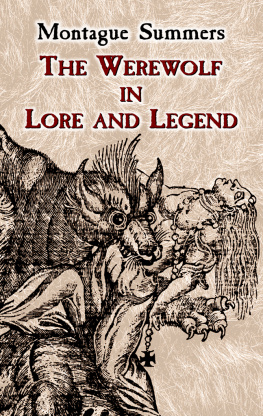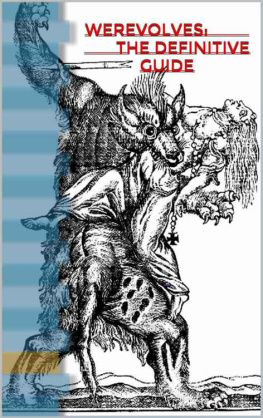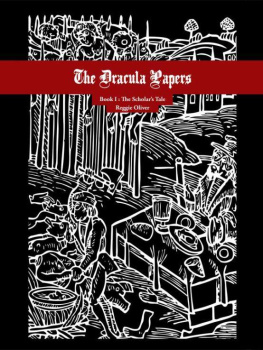THEWEREWOLF OF PARIS
byGuy Endore
Copyright1933 by Guy Endore
Forewordcopyright 1992 by Robert Bloch
ACitadel Press Book
Publishedby Carol Publishing Group
CitadelPress is a registered trademark of Carol Communications, Inc.
ToHenrietta Portugal
FOREWORD
Youare about to read a very remarkable book, written by a veryremarkable man.
_TheWerewolf of Paris_, first published in 1933, still looms large overthe field of fantastic fiction. But its author, Guy Endore, is almostobscured by the shadow of his creation.
Bornin New York in 1900, Harry Relis took a pseudonym, Guy Endore, tobecome a polished and published writer for some years before creatingthe novel which so savagely combines misanthropy with lycanthropy.His earlier biographical work, dealing with such disparatepersonalities as Casanova and Joan of Arc, won critical acclaim,although his 1930 novel, _The Man From Limbo_, evoked more puzzlementthan praise. Its fascinating style and offbeat premise earned fewkudos and fewer sales.
Butfrom the start, _Werewolf_ was, quite appropriately, a howlingsuccess. It has been reported that its author, mired in the depths ofthe Great Depression, sold his novel outright to Farrar &Rinehart for a total payment of $750. The book was an immediatesensation and remained a popular and profitable property in reprintmore than a decade later. Filmed by Hammer in 1961, as _Curse of theWerewolf_, the script owed little to the original story except,perhaps, a fervent apology. More than thirty years later, Guy Endorewas still being cheated of his just due.
Duringthose years his career rollercoastered. He changed publishers, butVanguard's 1934 edition of _Babouk_--a fervent depiction anddenunciation of slavery in French colonial Saint-Domingue--found nofavor.
Endorehad little time to brood over neglect. Universal's _The Werewolf ofLondon_ offers nothing of its Paris prototype, and emerged as afailure in its own right. Endore himself had signed with MGMfollowing his novel's acclaim, working with other screenwriters on_Mark of the Vampire_, _Mad Love_ and _The Devil Doll_. Over the nextfifteen years he shared screen credits on a half-dozen Hollywoodefforts, including such unlikely assignments as _Carefree_ and _TheStory of G.I. Joe_. Again his attention was directed to novels.
His1945 mystery, _Methinks the Lady_, was far ahead of its readers andits time. Typically atypical, like most of Endore's work, thisFreudian-oriented tale had a psychiatrist-hero who happened to be analbino.
Anothermystery, 1959's _Detour At Night_, is a much-lesser achievement. Inthe years between, the author gravitated to novelizedbiographies--Dumas, Voltaire, the Marquis de Sade.
Presumablythere was a Frenchman in Endore's ancestral background, as so much ofhis subject-matter would seem to indicate. And certainly _TheWerewolf of Paris_ offers insights of Gallic manners and mores duringthe turbulent times of the Commune.
Butfear knows no nationality--and Endore's skill at evoking that emotioninfuses this book with a life that has endured for six decades. Thecommentary, the social criticism it contains, is as vital today aswhen it first appeared in print, these were the elements which raised_The Werewolf of Paris_ far above its genre.
Allof which reflects credit on Endore, for the legends and literature oflycanthropy prior to the publication of his novel contain noobservations on society or the human condition--only the inhumancondition of werewolfery itself. It remained for Endore to elevatethe penny-dreadful approach of a _Wagner: The Wehr-Wolf_ and itsVictorian counterparts to new heights which combined the frightfulwith the insightful.
Therewas, of course, a real-life Sergeant Bertrand on which this novel isroughly based; at least it owes inspiration to Bertrand's actualcase-history.
Thatcase-history is probably best known to the English-languagereadership of Sabine Baring-Gould's 1865 _Book of Werewolves_, whichexcited widespread attention in both the British Isles and the UnitedStates. Today Baring-Gould is virtually forgotten; few even rememberthat this clergyman was once famed for writing _Onward ChristianSoldiers_, let alone his once-popular study of lycanthropism in factand fiction.
Hereis what he wrote about the real Bertrand:
Inthe autumn of 1848, several of the cemetaries in the neighborhood ofParis were found to have been entered during the night, and graves tohave been rifled. The deeds were not those of medical students, forthe bodies had not been carried off, but were found lying about thetombs in fragments. It was at first supposed that the perpetrator ofthese outrages must have been a wild beast, but the footprints in thesoft earth left not doubt that it was a man. Close watch was kept atPere La Chaise, but after a few corpses has been mangled there theoutrages ceased. In the winter another cemetary was ravaged, and itwas not until March, in 1849, that a spring gun which had been set inthe cemetary of S. Parnasse went off during the night, and warned theguardians of the place that the mysterious visitor had fallen intotheir trap. They rushed to the spot, only to see a dark figure in amilitary mantle leap the wall, and disappear in the gloom. Marks ofblood, however, gave evidence that he had been hit by the gun when itdischarged. At the same time a fragment of blue cloth torn form themantle was obtained and afforded a clue toward identffication of theravager of the tombs.
Onthe following day the police went from barracks to barracks,inquiring whether officer or man were suffering from a gunshot wound.By this means they discovered the person. He was a junior officer inthe 1st Infantry Regiment, of the name of Bertrand.
Hewas taken to the hospital to be cured of his wound, and on hisrecovery he was tried by courtmartial.
Hisstory was this.
Hehad been educated in the theological seminary of Langres till, at theage of twenty, he entered the army.... In February 1847 as he waswalking with a friend in the country, he came to a churchyard, thegate of which stood open. The day before a woman had been buried, butthe sexton had not completed filling in the grave, and he had beenengaged upon it on the present occasion when a storm of rain haddriven him to shelter. Bertrand noticed the spade and pick lyingbeside the grave. He managed by some excuse to get rid of hiscompanion and then, returning to the churchyard, he caught up a spadeand began to dig into the grave...
How'sthat for openers?
There'smore, of course--much more--but let Guy Endore tell you the story asonly he can, in a manner made memorable by his unique gifts of styleand the power of his prose. It would appear evident that Endore,always the avid scholar and diligent researcher, was thoroughlyfamiliar with this and many other versions of the Bertrand case, butit is his own interpretation which endures. Baring-Gould may havebeen the springboard, but Endore provided the splash.
Hishandling of the horrific retains its impact today, as does hisdetailing of the hypocrisies and injustices of the past--and thepresent. Guy Endore was a bitterly-perceptive writer from thebeginning of his career until his death in 1970.
Buthe did not seem to be a bitter man. At least that was not myassessment when we met, quite by chance in 1963. Modest, gracious,erudite, soft-spoken--these words come instantly to mould mymemories, but adjectives are inadequate to capture his quiet charm.The man I confronted over what proved to be a lingering luncheon at amotion picture studio's private dining room was scarcely theembodiment of anyone's image of a horror-fiction writer. Nor did he,in the course of conversation, directly convey his works' passionateplea for justice, or its rage against social and political iniquitiesand inequities.
Yetthese are the elements which raised _The Werewolf of Paris_ far aboveits genre, soaring beyond the supernatural or the purelypsychopathological.
Next page








